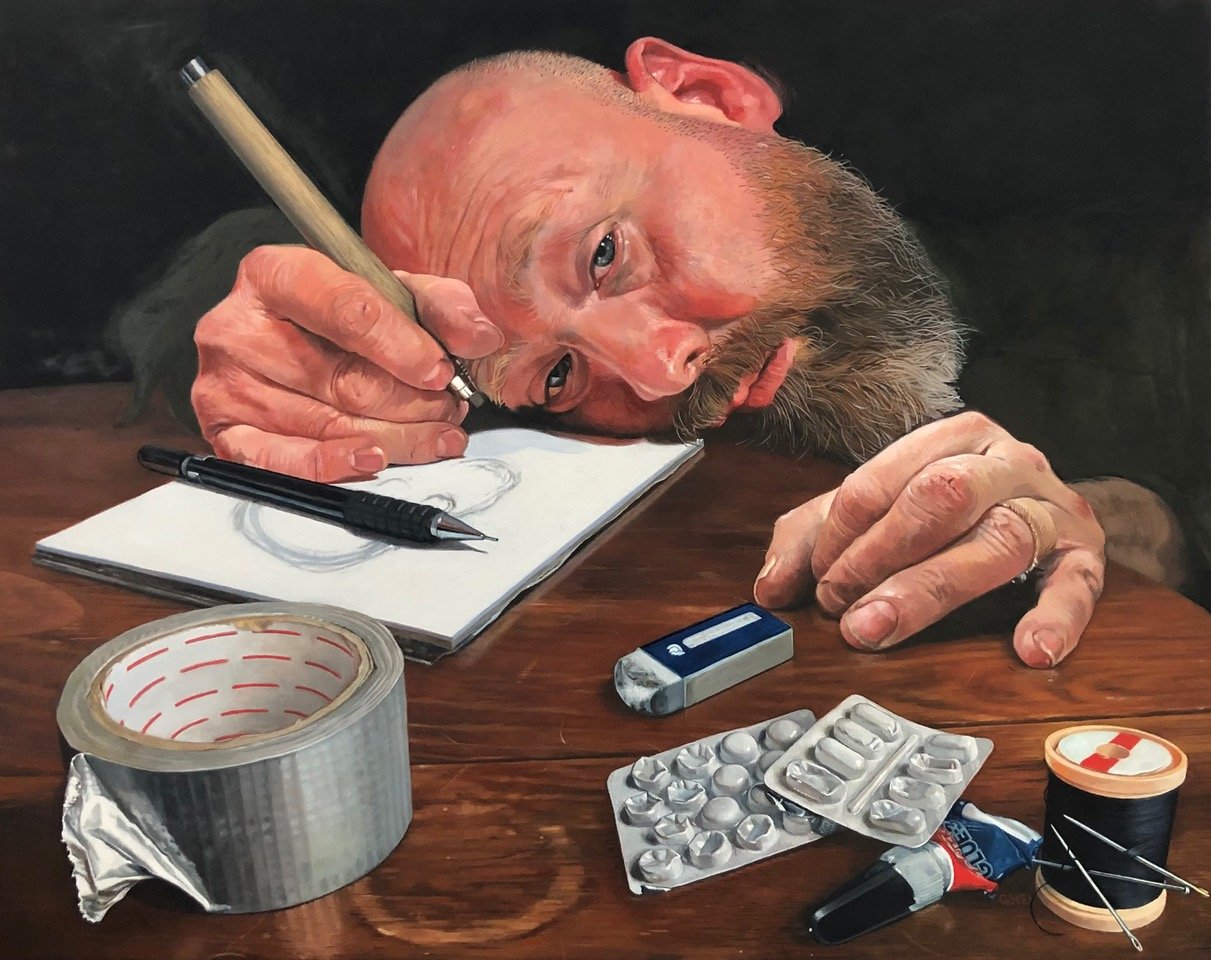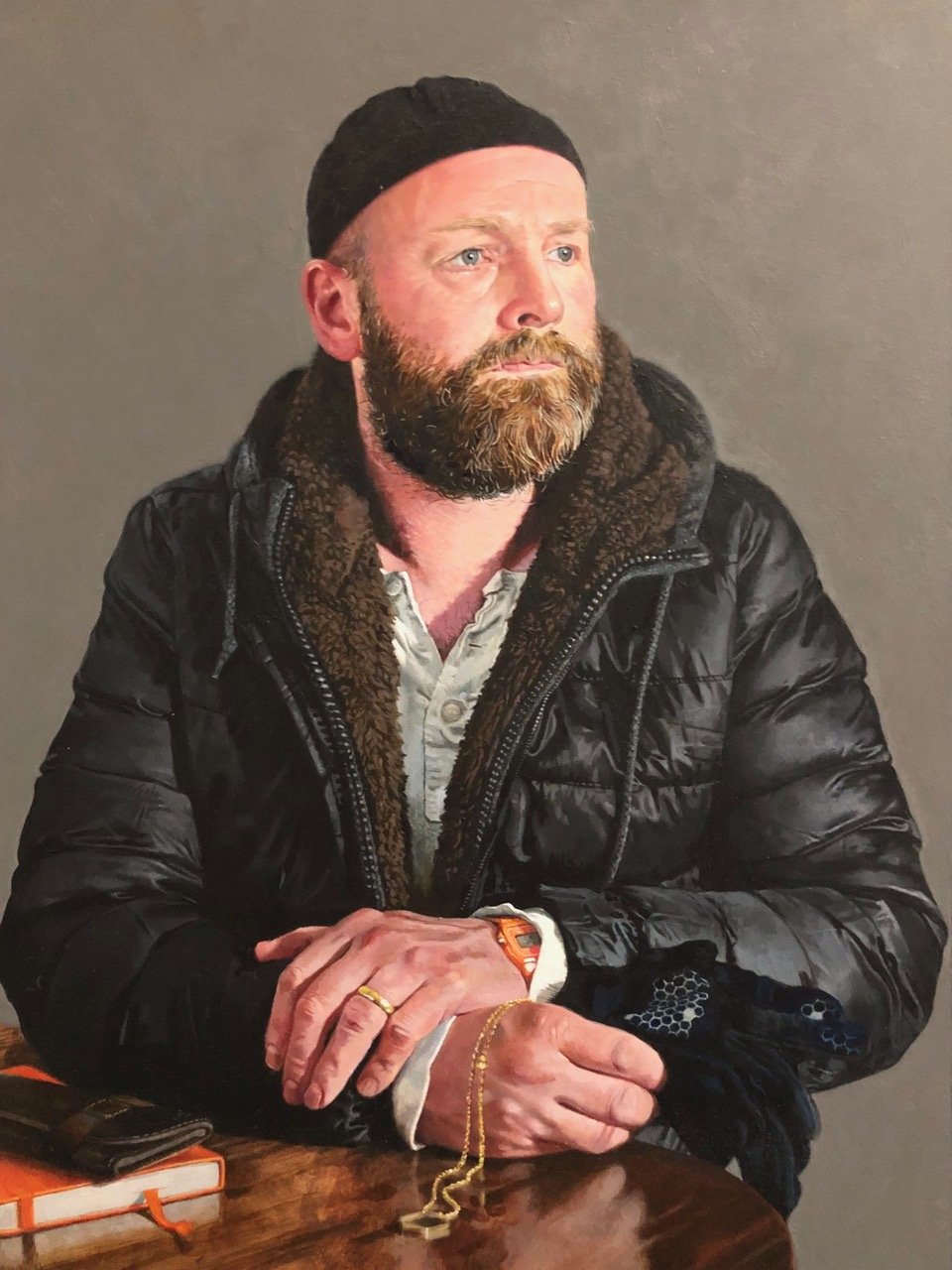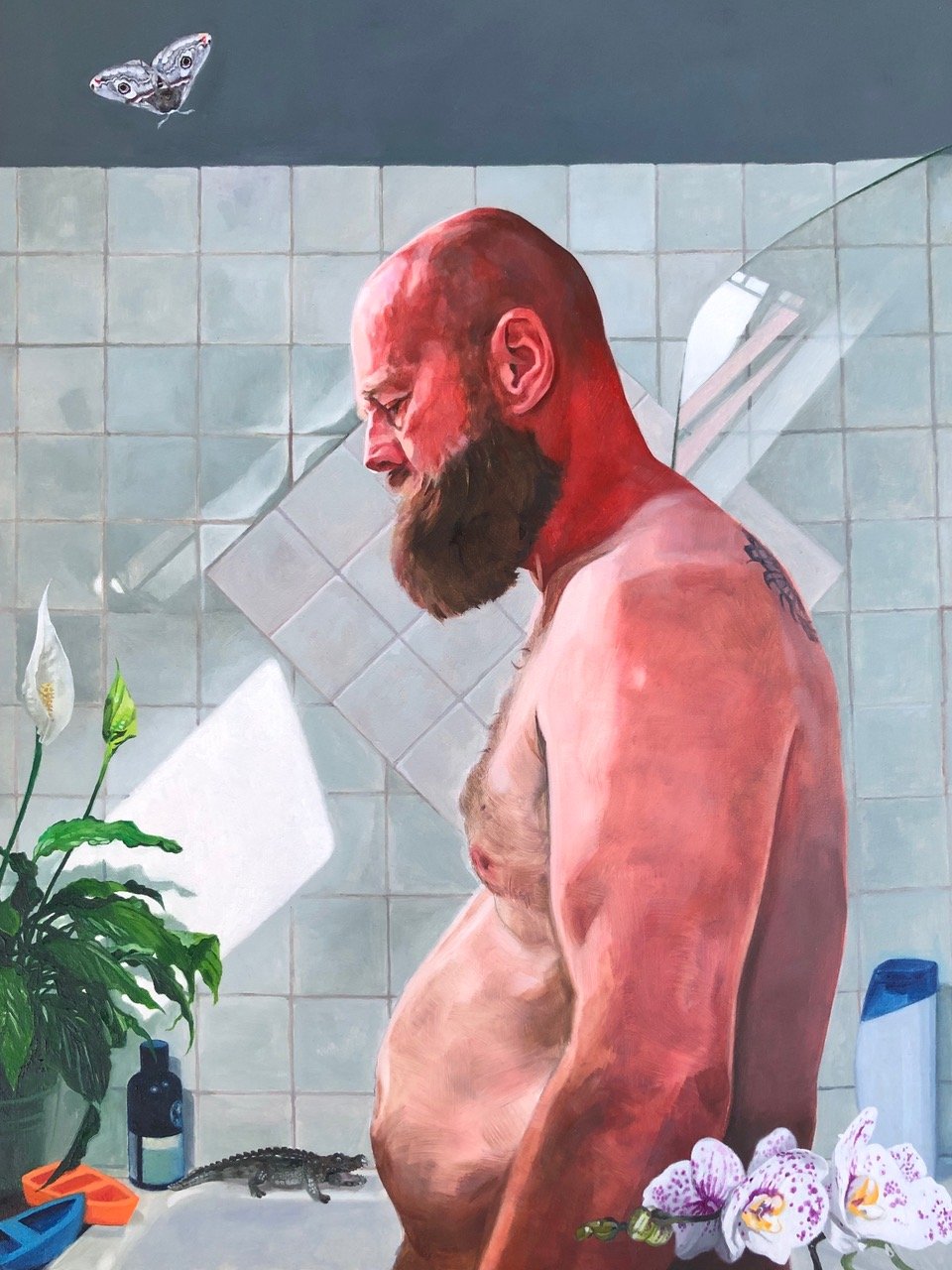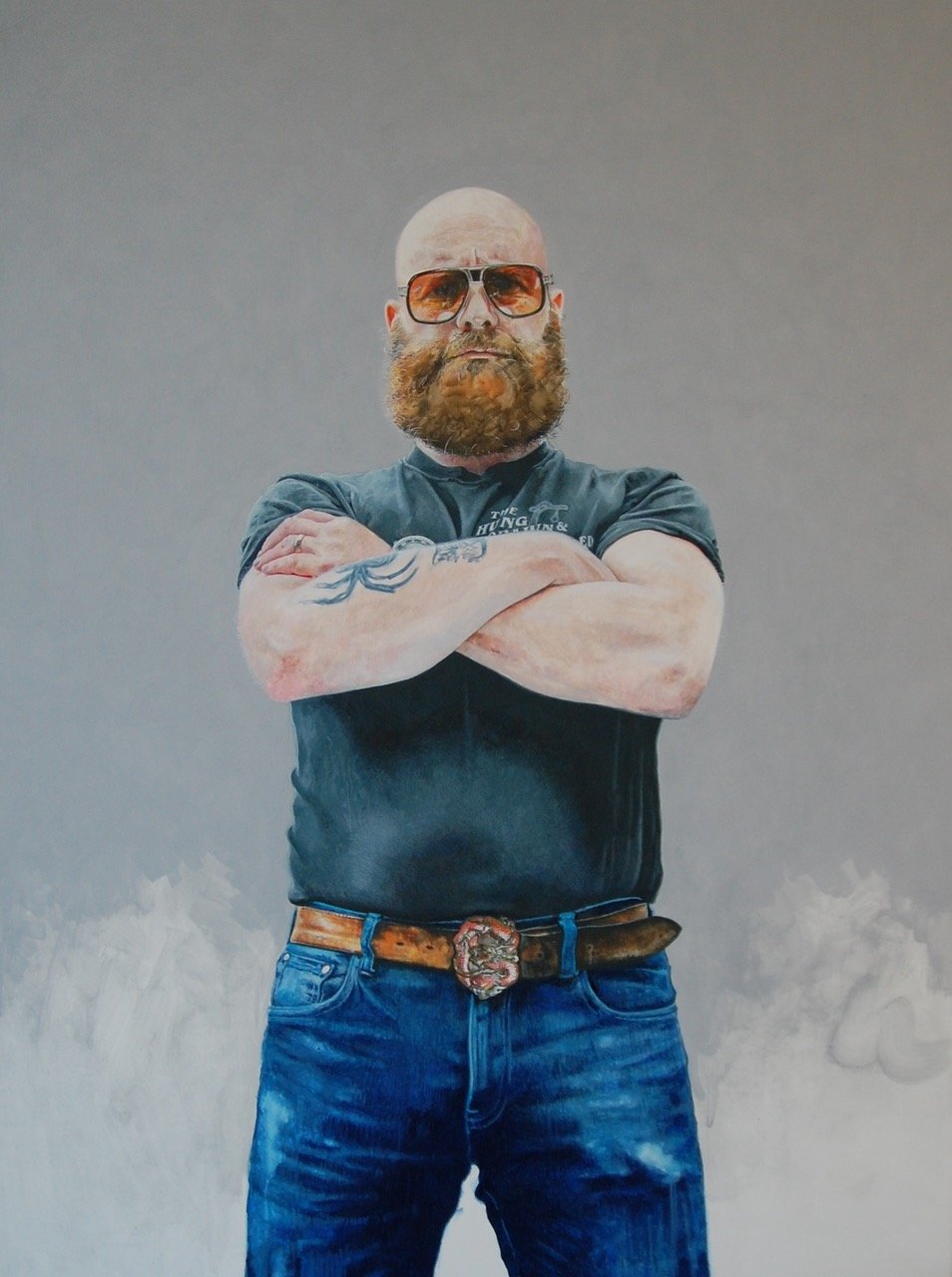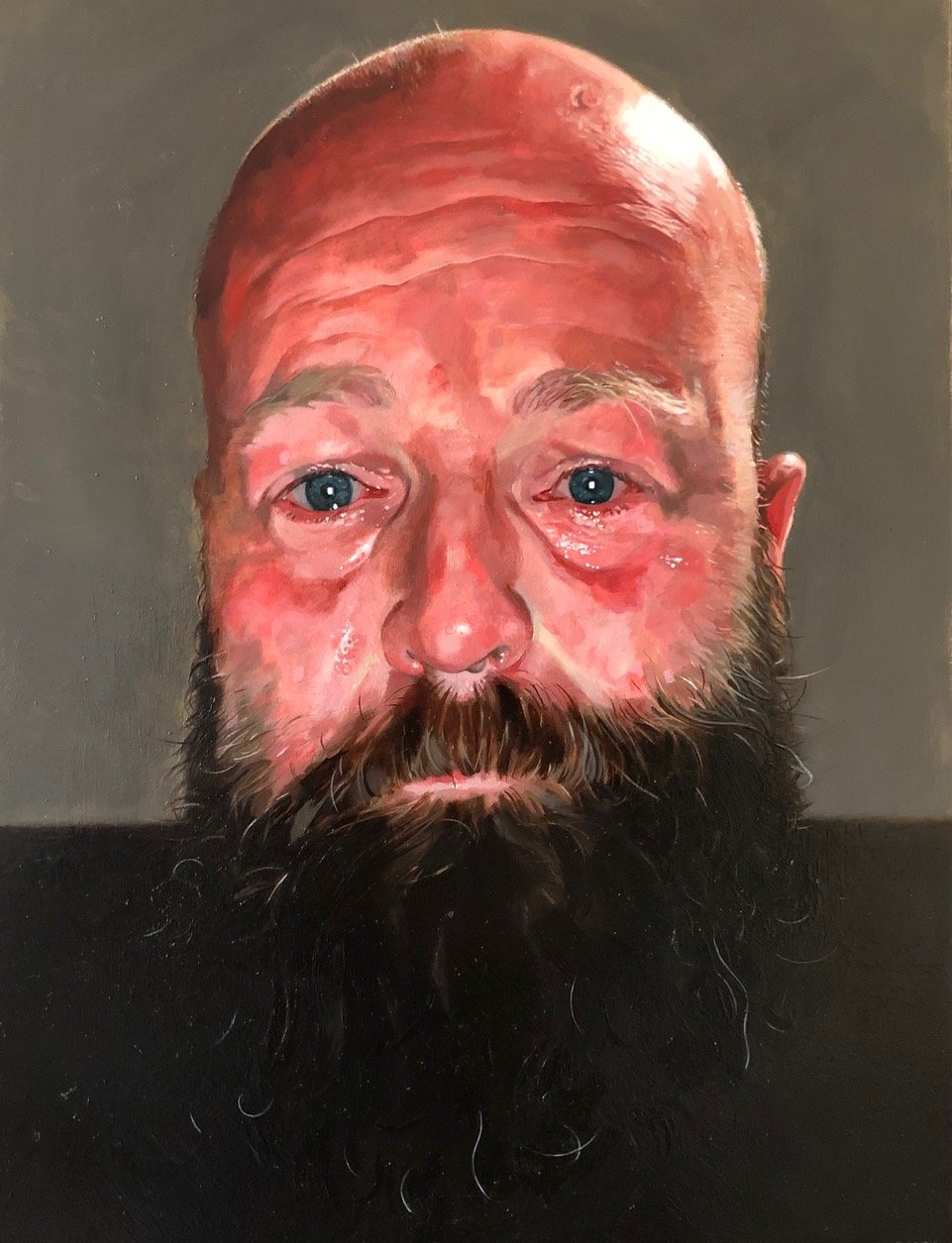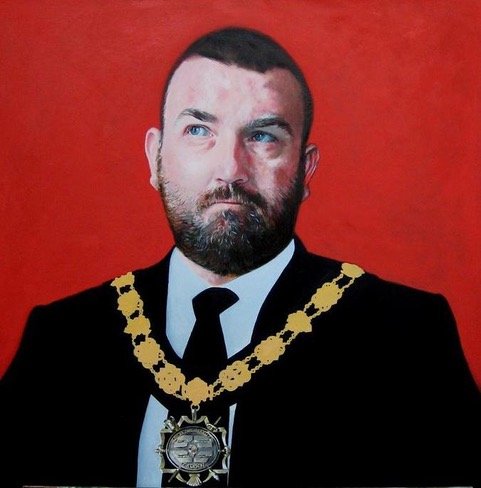ARTIST INTERVIEW: Geoffrey Harrison
Geoffrey Harrison
Hi! My name is Geoff Harrison. I’m a figurative artist and I’m mostly interested in painting portraits. I work on commission, but I also have my own portrait work that I do. I’m based between London and Bristol.
I have always drawn or painted, and I think making art is right at the core of my identity.
All my family are artists, so I grew up with pictures being a very normal mode of communication, and I never really thought about it. I went to art school, but studied printmaking and was never really taught to paint, so I sort of consider myself self-taught as far as painting goes. That’s just about technique though. The art process is the same regardless of the medium, I think.
Self Portrait (with remedies)
What inspired you to do portraiture? What is it about faces that interests you?
I really like people and I love an interesting face. What I find marvellous is that not only is every face is different, each has infinite capacity for expression, so one person can look markedly different depending on their mood, animation etc, but it’s still them. It’s strange then that we can still recognise someone with all this variation, yet if we paint a fractionally different nose angle or a slightly rounder eye, it can completely lose a likeness. Similarly however, paying little attention the objective proportions and dimensions of a face can still result in the successful capture of a personality. I am always trying to get as much of both types of likeness as possible in my work and its something that makes my job endlessly fascinating and varied.
Self Portrait in Puffer Jacket
Has studying in Japan influenced your work? What did you gain from the experience?
My time spent working and studying in Japan was certainly formative in my development as a human, and this is what my work is all about, but I don’t know if there’s an aesthetic influence in my work from it. Maybe though. Japan is a wonderful place to live. I was lucky enough to live in a few big cities as well as in the countryside and there’s so much for the senses, so I guess things are always going to percolate through. Just before returning to the UK, I spent a year living on a remote island in the Pacific. I didn’t paint or draw really during this entire year, but the experience consolidated my interest in art as a practice beyond straightforward representation. It might seem strange as a figurative artist to say that, but my work is less about what it looks like on the surface and much more about the thought process.
Describe your creative process; from start to finish of a painting. Where do you find your inspiration?
I am always working on ideas, and like many artists, there are things I want to work on 2 or 3 paintings hence. There’s a particular joy in getting a new panel prepared to paint on and getting started, so it’s hard not to keep starting new things. I enjoy the painting part but in actuality, the artwork has typically begun long before and what I want to make is already formed in my head. Some changes might occur of course, but the execution is really just the final phase in a process.
I’ve tried many times to locate this quote that sits at the back of my mind always when I work, but it goes a bit like this: ‘the creativity ends the moment the brush touches the canvas’. It may have been Dali, but more likely Rosenquist, I don’t know. I have held by this a lot, I think. The thought process, the sketchbook, the daydreaming is where my creative process is and its always going on.
I used to think that the painting part of my practice was mostly devoid of feeling content. The image conveyed the message. Then, about 2 years ago my wife died and I found that I wasn’t able to paint or draw. I tried, I just wasn’t feeling it. This might seem fairly obvious to you, but since I felt that I wasn’t ever putting a lot of myself into my painting, that I was just ‘colouring in’, I didn’t anticipate this problem. It wasn’t a block per se, it was more of a lack of motivation. What it taught me though was that there was always an amount of ‘me’ in my active process of painting. I took it as a very positive sign, rather than a worry, and this has driven the development of my work to allow in more expression in my brush-marks and to seek improvement there.
Mayor (Jonathan Simpson, Mayor of Camden)
What is your favourite piece of work you have created and why?
I think the idea of ‘favourite’ is probably not a particularly useful one for me. All the work I make has bits I like and bits I don’t. Depending on the season, the things going on outside the studio and my mood, the things that I look at and enjoy change. There are a few pieces that, in hindsight, I might have preferred not to sell, so I clearly favour some more than others.
Who is your favourite artist and why? Do they have an influence on your work?
I don’t think I have a particular favourite artist. I like lots of people’s work. I never used to find Lucian Freud particularly interesting, but I am getting to really like his stuff, probably because of his process. Today, I’m enjoying the monumental solidity of Euan Uglow and the expressive ‘don’t-give-a-shit-what-you-think’ about Alice Neel’s work. I suppose I will always love Piero de la Francesca. Among contemporary painters, Kehinde Wiley creates such lush, rich images, Nicholas Uribe is a brilliant mark maker and Jenny Saville was important in reminding me that painting wasn’t ever dead.
What do you think is the key to capturing a likeness?
First of all, an objective likeness is not the be-all-and-end-all of portraiture. It’s great if you can approach it and something I certainly aim at, but when working from life, it’s more important to convey the spirit of a person, their attitude and energy. Spending time with a person, getting to know them and being sincere about your motives for making the work are key to distilling this. So is not being afraid to rework the bits you think are ‘nice’, to make them work properly.
Self Portrait with Lily
Do you work on multiple pieces at a time or just focus on one piece of artwork?
I always have a couple of pieces on the go. Also, I’m always thinking about and planning paintings, gathering resources etc. Add to that all the paintings that I have let go of and have left the studio with things I still want to do to them, and you have rather a lot of ongoing projects!
How has your art changed since you started creating it?
Someone looking from the outside might observe that very little has changed stylistically or in terms of content in my work, but I would say that a lot has changed in my approach. I’ve certainly become more interested in what’s happening on the surface of my painting, so my work has probably become more ‘painterly’ and I want to develop this a lot more.
What has been your greatest achievement so far as an artist?
I think when I finally convinced myself (rather than other people), that I was a ‘proper’ artist was a great changing point for me. I think for a long time I was doing art alongside other paying work and I didn’t feel like I was legit somehow. This is not unusual among artists, many (most?) of whom have another gig that pays the bills. It’s a kind of Imposter Syndrome, I suppose. I had to tell myself over and over that doing it for a full-time living was not the defining characteristic of a successful artist. It took a lot of this Neuro Linguistic Programming, but I got there! Now that I am a full-time artist, I can see that there is no difference.
Self Portrait
Why do you think art is important in society?
What’s the point of society without creativity? No music, no novels, theatre, movies or tv, no football, no fashion, empty galleries and museums, no gardens, no architecture or interior design. Art is present in all these things and without it, we would be so emotionally and mentally un-nourished that none of the other non-art and ‘essential’ things we do as part of society could make up for that. That said, if my contribution to culture were never to have happened it might only impact me. It’s good for artists to be reminded of this! As artists, we have to support each other because it’s our collective creative action that makes life for everyone worthwhile. Some people won’t ever get it, but you don’t have to get it to be reliant upon it.



